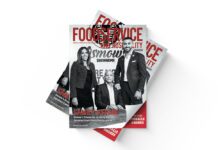If you read E.B. White’s short 1952 novel, Charlotte’s Web, as a child, there’s a good chance the lessons bestowed from the tale of unlikely friendships between a little girl, a pig and a spider, stayed with you into adulthood. On the surface, it’s a sweet story of talking farm animals, but White cleverly uses the ordinary to teach us about life and death; compassion and understanding; innocence and corruption. The fable also conveys a message about animal rights and the importance of respecting all living things, no matter how small. It’s fitting, then, that the tale of Beretta Farms — a family-run business that prides itself on raising animals in much the same way the owners have raised their children — begins with two little pigs named Charlotte and Wilbur.
When founders Cynthia and Mike Beretta started the business in 1992, neither one of them had any farming experience. What they did have was the inspiration to buy a couple of animals and raise them with care before harvesting them to sell to family and friends. “We’ve always believed in ethically raised animals,” Mike Beretta says. “We named our first two pigs and raised them the best way we knew how. As the company grew, we realized we couldn’t name all of our animals, but we could raise them humanely and with respect. We value them as creatures; that’s the right way to do it.”
The couple’s initial offering went over so well, they decided to do it again. First there were more pigs, then cattle and chickens, too. While the Berettas have been producing organic meat from the get-go — never using antibiotics or hormones — the concept wasn’t nearly as trendy as it is today. “We had no idea we’d become pioneers, we just got hooked on it,” Beretta says. “Our customer base kept growing and our staff kept growing. It was obvious we were offering something people wanted, but we never intended to carve out a niche.”
Mike went on to study agriculture at the University of Guelph, to fill in the gaps in essential knowledge of his new-found calling. After he graduated in 1994, the company had an opportunity to purchase a small abattoir and butchery in Wingham, Ont., and began processing its own products. A few years later, the Berettas bought their 800-acre farm in King City, Ont., where they raised their three children, as well as the much larger herds needed to meet growing customer demand. Over the years, they’ve hosted many Family Farm Day events, inviting folks to enjoy a day-in-the-life on the range, including feeding the pigs and collecting fresh eggs. In 2013, Beretta Farms was sold to One Earth Farms, a large-scale premium-branded meat business, where Mike is CEO and Beretta Farms is the flagship brand. Last year, the company surpassed $50 million in revenue.
These days, the Berettas do less farming of their own, instead partnering with other farmers who share the same values and commitment to organic, ethically raised animals. “We have a network of ranchers from Ontario to British Columbia who grow for us,” Beretta says. “We still live on the farm and our hobbies are farm-related, but now we focus on the marketing and the storytelling. We’re helping other ranch families to grow and market themselves.” Other businesses under the One Earth Farms umbrella include Beretta Kitchen, a farm-to-fork catering company started by Cynthia; Heritage Angus, comprised of a group of Western Canadian ranch families; Black Apron Beef, a private-label brand offering premium cuts of Canadian Angus beef; as well as several other businesses and brands. “As business scales, you have to make sure you don’t lose sight of your core values. We’ll never be the small husband-and-wife business growing a few pigs, but that experience is still so important in everything that Beretta Farms has become,” he says.
The Beretta motto is “Sharing What Matters” and over the past two years, the company has been creating new partnerships and offering innovative services in order to share its vision with more customers. “Prior to last year, we had shied away from foodservice. We had some clients, but we were more focused on larger retailers, butcher shops and health-food stores. In 2015 and 2016, we’ve created great new relationships in foodservice,” Beretta says. Some of the company’s new partners include Oliver and Bonacini Restaurants, Chipotle Mexican Grill, Earls Kitchen and Bar and Centennial Foodservice. In June 2016, Beretta also launched an e-commerce business called The Frozen Butcher, offering home delivery of its frozen products to customers across Canada, as well as in-store pick-up in Toronto. “We used to do home delivery with Beretta Farms, but as we grew, it wasn’t efficient for us anymore. It meant a lot to us — connecting directly with other families — and we wanted to bring that back. The Frozen Butcher is completely online, so it’s a more modern approach to home delivery,” he says.
Staying true to Beretta roots, The Frozen Butcher sells only certified organic, antibiotic- and hormone-free meat. Products are flash-frozen and individually vacuum-sealed, before being bundled into a reusable polystyrene cooler with enough ice packs to keep everything frosty until it reaches the home freezer. (One of the biggest challenges with the service so far was managing product quality in the sweltering temperatures of summer 2016.) The online shop sells beef, chicken, pork, bison, seafood, ready-made meals and a handful of dry goods. “We got off to a great start and we’re very pleased with how the business is going,” Beretta says.
The Frozen Butcher supports Heifer International, a charitable organization with a mission to end hunger and poverty by providing livestock and agricultural training in communities where people lack reliable food sources and income. Heifer works in more than 30 countries and The Frozen Butcher focusses its efforts in Peru, where Mike grew up and played professional soccer. “Frozen Butcher customers are encouraged to support Heifer International and we’ve made the commitment to match their donations,” he says. Beretta chose the organization for its obvious livestock connection, but there’s more to the story: Heifer participants must agree to pass on the first female offspring of any livestock they receive to another family in need, to keep the momentum growing in their community.
The pay-it-forward concept resonates with the Berettas. In 1995, after losing their barn and livestock in a fire, the neighbouring Mennonite community helped them rebuild and passed along Ben and Mabel, two Percheron horses. They would not accept payment for their great assistance, but instead suggested that the Berettas be indebted to the next person who asked them for help. Much like Charlotte’s Web, the Beretta Farms story is one we can all take lessons from to help make the world a kinder, better place.
Volume 49, Number 9
Written By Lindsay Forsey



















